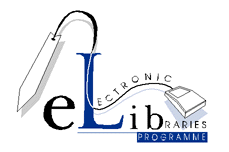JILT: The Journal of Information, Law and Technology
- Project web site
-
http://elj.warwick.ac.uk/
- Programme area
-
Electronic Journals
- Contact details
-
Nicola Clare, Electronic Journal Developer,
Centre for Law, Computers and Technology University of Strathclyde, Glasgow, G4 ORQ
Phone: 0141 548 4735 Fax: 0141 552 4264
Email: nicolac@law.strath.ac.ukMs Yael Kahn, Web Consultant,
CTI Law Technology Centre, University of Warwick Coventry, CV4 7AL
Phone: 01203 524492 Fax: 01203 524105
Email: yael@themis.law.warwick.ac.uk
Project description
as of 4th January 1996
Objectives
The underlying objective of the project is to promote through the development of an electronic Journal of Information, Law and Technology and other journals, a discursive electronic culture involving the academic community in the writing and reading of law journals.This will be achieved through the following:
- Initial activity - An international refereed journal dealing with substantive legal implications of information technology and implications of information technology for legal education andpractice;
- Subsidiary activity - In collaboration with existing legal publishers, development of electronic versions of existing journals in the area (so-called parallel publishing);
- Core activity - an electronic journal environment for law which will be used as the basis for publication in other legal subject areas (again in collaboration with existing legal publishers.) This journal environment will encourage new forms of collaborative work between academics from different jurisdictions.
The journal environment
The environment will be a 'living' one which will go beyond mere text on screen:- Articles will use hyper- and multi-media applications. The use of hypertext, will be particularly important in developing a sense of connectivity in the literature and enabling the ease of research which is a primary contribution of the electronic journal format to scholarship. Multimedia features such as graphic images, sound and related software, where relevant, can qualitatively enhance the presentation and communication of meaning, particularly in technically complex areas such as information technology and law.
- The journal environment will go beyond the simple reading of the text of articles and produce enhanced levels of interaction between authors, editors and readers. For example, at the editorial stage, much can be gained in speed by establishing electronic communication between authors and editors and, after acceptance, between authors and reviewers. Unlike paper journals, this electronic environment will also facilitate interaction between authors and readers.
- This level of interaction will promote a dramatic shift in culture from the present situation where the publication of an article means the end of the process to a more evolutionary process of on-going debate. While we will permit authors to revise their articles on the basis of comments received even after publication, this will be a strictly controlled process. We will use the metaphor of book editions for each revised article in controlling this revision.
- There will also be provision for links to other legal materials available on the Internet and to back copies of the Journal. Whilst it is intended that the journal will be made available via the Internet, we are also considering the production of an annual version in CD-ROM format.
Content
- Around 15 major new articles a year for the journal (initial target) selected both for the level of scholarship displayed and their potential to demonstrate the advantages of the technology. At the beginning a number of submissions will be requested from leading scholars in order to establish the reputation of the journal. Submissions will be reviewed by an distinguished international review group. New articles should be published as and when they are completed. This is a major advantage in a field where material may date rapidly.
- Up to the minute summaries of cases, legislation, book reviews and other legal developments throughout the world with the assistance of local correspondents.
- European Commission and other documents which do not otherwise receive a wide circulation.
The audience
The Journal of Information, Law and Technology will appeal to an international audience of academics interested in information technology law as well as applications related to law. We wish to address a wider academic audience than simply law schools. It is difficult (and foolish) to attempt to distinguish the legal implications of new technological development from their context. Therefore, within the boundaries of this Journal, we would wish to explore the sociological, economic and technical as well as the legal aspects of new technology. Furthermore, there is considerable interest amongst computer scientists in legal topics such as computer crime, database protection and the liabilities that may arise in respect of defective software.
Participants
The main participants in the project are the CTI Law Technology Centre at the University of Warwick and the Centre for Law, Computers and Technology at the University of Strathclyde. The project is supported by the British and Irish Legal Education Technology Association (BILETA) and major law publishers.
The Project will be managed under the overall direction of Dr. Abdul Paliwala leading a team of academics and information technologists from the two Centres. A group of leading international scholars and practitioners has agreed to be members of the advisory editorial board for the Journal of Information, Law and Technology. A similar advisory board will be appointed for the second journal.
Publication of first issue: January 1996.

